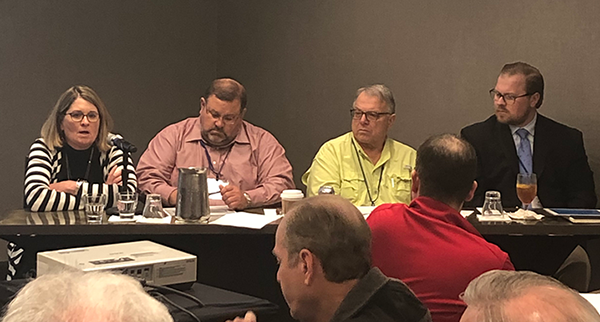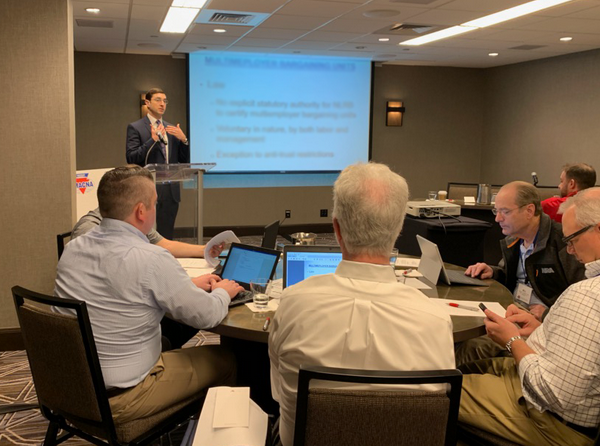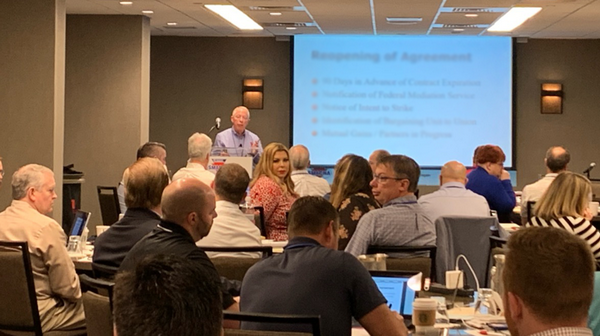
SMACNA’s Collective Bargaining Orientation is tailored for chapter executives and new and future bargainers.
Labor negotiations are not for the faint of heart. While labor and management share many common interests, at times, negotiations may bring out the differences and become protracted and acrimonious. The very nature of negotiations implies “give and take” by both parties.
Neither party ends up obtaining every item on their respective members’ wish list. Members representing their chapters in negotiations for a new collective bargaining agreement are clearly in one of the toughest and most important volunteer positions for contractors.
SMACNA offers a variety of services to prepare management bargainers and offers more significant resources than other union trade associations.
Before Bargaining Begins
New or future bargaining committee members should plan to attend SMACNA’s Collective Bargaining Orientation, now a one-day program held in a central location, covering all the basics and foundations for bargaining. The 2019 Collective Bargaining Orientation was held March 12 in Dallas, Texas.

Michael McNally of Felhaber Larson speaks at the CBO.
If members are bargaining in 2019 and missed that opportunity, the educational presentations and handout materials are available under Presentations and Reports on SMACNA’s members-only Labor Relations web page at smac.news/2f396.
When requested by local labor and management parties, SMACNA and SMART will consider jointly conducting a Mutual Gains Bargaining Workshop designed to improve contract bargaining, grievance negotiations and labor-management communication. Used correctly, this type of bargaining can be highly effective in addressing problems in an area and reaching a settlement in a less adversarial manner. The program is most successful when labor and management parties from multiple local chapters and unions attend and participate.
Requests for this program need to be made by the local chapter in writing to SMACNA’s Director of Labor Relations Jason Watson at jwatson@smacna.org. If a member’s area has an interest in this program, remember that it should be conducted in advance of the onset of formal negotiations. The program is typically held in January or February.
What if members need someone locally to bring their entire management negotiating team up to speed? Jason Watson, director of labor relations, may be able to visit the chapter to discuss current bargaining trends and SMACNA resources.
Researching and Preparing to Bargain
Members may review the Collective Bargaining section on SMACNA’s Labor Relations web page at www.smacna.org/labor/collective-bargaining-negotiations to review the economic terms and contract language in other industry collective bargaining agreements to obtain samples of favorable contract language.
SMACNA’s Labor Relations website also provides statistics on local and regional sheet metal settlements along with studies by the Construction Labor Research Council (CLRC) that provide information on bargaining trends for all the construction trades.

SMACNA consultant, Tom Keating speaks at the 2019 CBO
If members need an indication of the amount of union and non-union sheet metal work in their local area, They can contact SMACNA’s Labor Relations staff for employment share information. This data is tailored to the jurisdiction of the members’ bargaining agreement. These reports show the number of union versus non-union sheet metal workers employed in a member’s area, if the chapter provides SMACNA with a copy of its current collective bargaining agreement and if SMACNA National has numbers for the area. Chapter executives are provided with this information each January.
Another highly recommended resource is the Annual Labor Report, which is a statistical analysis of responses to a survey of labor relations in local areas. The report includes man-hour projections as well as changes to the contractor base in local regions. It also focuses on grievance activity and overall labor-management relations. Electronic copies of the Annual Labor Report are available on SMACNA’s Labor Relations Presentations and Reports web page at www.smacna.org/labor.
Designed to provide chapters and contractors with timely bargaining data, the Annual Bargainers Mailing includes the latest information on health-care cost projections, sheet metal and construction industry contract settlements, and federal mediation and conciliation service assistance as well as filing requirements and the most recent wage and fringe manual. An electronic copy of this helpful resource is available on SMACNA’s Labor Relations’ Collective Bargaining web page at www.smacna.org/labor.
Help During Bargaining
If members have questions on matters that come up in their local negotiations, they can call SMACNA’s Labor Relations staff any time for advice and guidance. Staff receives 300 to 350 such inquiries each month from SMACNA members and chapters. The Labor Relations Department is available to help.
Members may also sign up for the Labor Relations Department’s Bargainers Conference Calls, which are held monthly March through June, to learn of the latest in industry bargaining trends. During the calls, they may also ask questions of labor relations staff and legal counsel. Participating on these calls is a great way to share real-time bargaining information with one another. Members may contact jwatson@smacna.org to participate in these calls.
Members may also subscribe to the Bargainers’ Listserv on SMACNA Connect at www.smacna.org/labor/bargainers-list-serve to receive timely settlements for other chapter areas and to communicate with other chapter bargaining committee members.
Heading Towards Impasse?
The Labor Relations staff hopes not, but what if a member’s negotiations are looking like they are not going to resolve locally? If the area has Article X, Section 8 interest arbitration, SMACNA’s Labor Relations staff can walk the committee through the preparation and processes for National Joint Adjustment Board hearings.
There is also a valuable webinar, Everything You Need to Know Before an NJAB Appearance, available on SMACNA’s Events and Education web page under Webinars at smac.news/3a0d0.
If a member’s area does not have interest arbitration and negotiations and the member believes there is a possibility of a work stoppage at contract expiration, SMACNA’s Labor Relations staff can also provide guidance and support.
SMACNA is dedicated to providing solid education and support to chapter bargaining committee members. For questions on collective bargaining programs and services, please contact Jason Watson, SMACNA’s director of labor relations, jwatson@smacna.org.
For questions on NJAB interest arbitration or inquiries on benefit funds contained in the bargaining agreement, contact Joye Blanscett, SMACNA’s director of labor services and human resources, jblanscett@smacna.org.
SMACNA’s Executive Director of Labor Relations and Human Resources, Deborah Wyandt, Esq., dwyandt@smacna.org, is also available for consultation on members’ bargaining and arbitration questions.
SMACNA’s Labor Relations staff is ready to help members with their questions and needs before, during and after bargaining season.